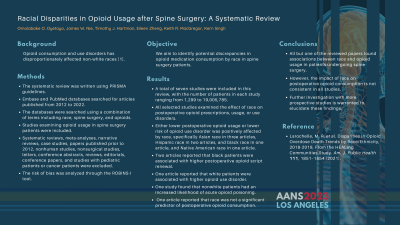Racial Disparities in Opioid Usage after Spine Surgery: A Systematic Review
Racial Disparities in Opioid Usage After Spine Surgery: A Systematic Review
Friday, April 21, 2023


James W. Nie, BS (he/him/his)
Medical Student
University of Illinois College of Medicine
Chicago, Illinois, United States
ePoster Presenter(s)
Introduction: We aim to identify potential discrepancies in opioid medication consumption by race in spine surgery patients.
Methods: The systematic review was written using PRISMA guidelines. Embase and PubMed databases searched for articles published from 2012 to 2022. The databases were searched using a combination of terms including race, spine surgery, and opioids. Studies examining opioid usage in spine surgery patients were included. Systematic reviews, meta-analyses, narrative reviews, case studies, papers published prior to 2012, nonhuman studies, nonsurgical studies, letters, conference abstracts, reviews, editorials, conference papers, and studies with pediatric patients or cancer patients were excluded. The risk of bias was analyzed through the ROBINS-I tool.
Results: A total of seven studies were included in this review, with the number of patients in each study ranging from 1,299 to 19,005,785. All selected studies examined the effect of race on postoperative opioid prescriptions, usage, or use disorders. Either lower postoperative opioid usage or lower risk of opioid use disorder was positively affected by race, specifically Asian race in three articles, Hispanic race in two articles, and black race in one article, and Native American race in one article. Two articles reported that black patients were associated with higher postoperative opioid script renewal. One article reported that white patients were associated with higher opioid use disorder. One study found that nonwhite patients had an increased likelihood of acute opioid poisoning. One article reported that race was not a significant predictor of postoperative opioid consumption.
Conclusion : All but one of the reviewed papers found associations between race and opioid usage in patients undergoing spine surgery. However, the impact of race on postoperative opioid consumption is not consistent in all studies. Further investigation with more prospective studies is warranted to elucidate these findings.
Methods: The systematic review was written using PRISMA guidelines. Embase and PubMed databases searched for articles published from 2012 to 2022. The databases were searched using a combination of terms including race, spine surgery, and opioids. Studies examining opioid usage in spine surgery patients were included. Systematic reviews, meta-analyses, narrative reviews, case studies, papers published prior to 2012, nonhuman studies, nonsurgical studies, letters, conference abstracts, reviews, editorials, conference papers, and studies with pediatric patients or cancer patients were excluded. The risk of bias was analyzed through the ROBINS-I tool.
Results: A total of seven studies were included in this review, with the number of patients in each study ranging from 1,299 to 19,005,785. All selected studies examined the effect of race on postoperative opioid prescriptions, usage, or use disorders. Either lower postoperative opioid usage or lower risk of opioid use disorder was positively affected by race, specifically Asian race in three articles, Hispanic race in two articles, and black race in one article, and Native American race in one article. Two articles reported that black patients were associated with higher postoperative opioid script renewal. One article reported that white patients were associated with higher opioid use disorder. One study found that nonwhite patients had an increased likelihood of acute opioid poisoning. One article reported that race was not a significant predictor of postoperative opioid consumption.
Conclusion : All but one of the reviewed papers found associations between race and opioid usage in patients undergoing spine surgery. However, the impact of race on postoperative opioid consumption is not consistent in all studies. Further investigation with more prospective studies is warranted to elucidate these findings.
